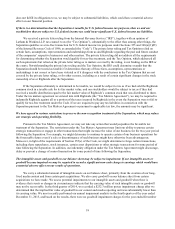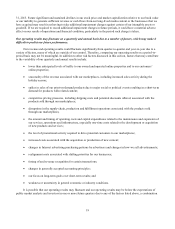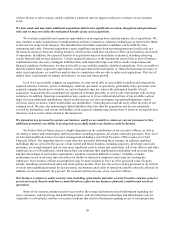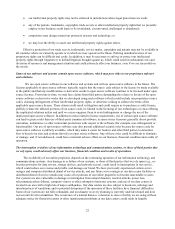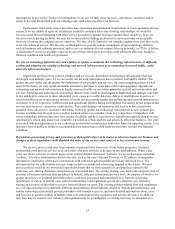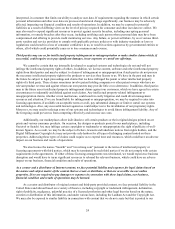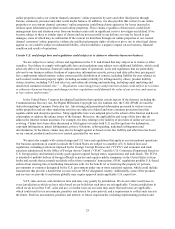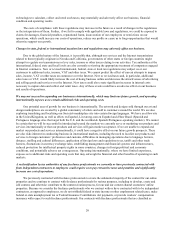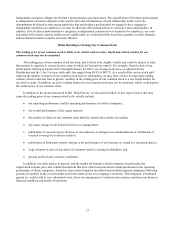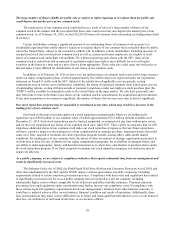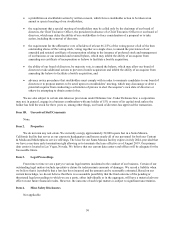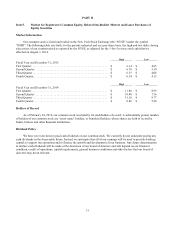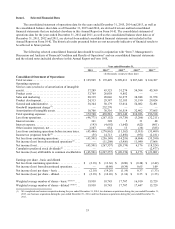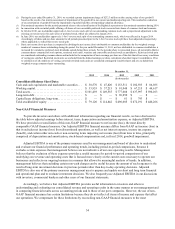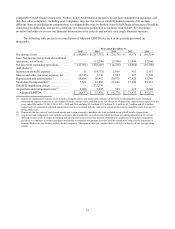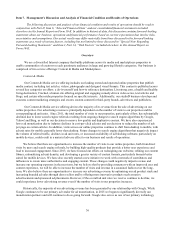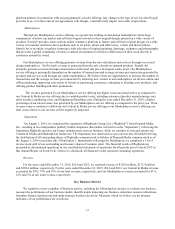Enom 2015 Annual Report Download - page 30
Download and view the complete annual report
Please find page 30 of the 2015 Enom annual report below. You can navigate through the pages in the report by either clicking on the pages listed below, or by using the keyword search tool below to find specific information within the annual report.28
The large number of shares eligible for public sale or subject to rights requiring us to register them for public sale
could depress the market price of our common stock.
The market price of our common stock could decline as a result of sales of a large number of shares of our
common stock in the market, and the perception that these sales could occur may also depress the market price of our
common stock. As of February 24, 2016, we had 20,250,726 shares of common stock outstanding (excluding shares held
in treasury).
Certain stockholders owning a significant amount of our outstanding shares of common stock are party to a
stockholders agreement that entitles them to require us to register shares of our common stock owned by them for public
sale in the United States, subject to the restrictions of Rule 144. In addition, certain stockholders, including investors in
our preferred stock that converted into common stock as well as current and former employees, are eligible to resell
shares of common stock under Rule 144 and Rule 701 without registering such shares with the SEC. Sales of our
common stock as restrictions end or pursuant to registration rights may make it more difficult for us to sell equity
securities in the future at a time and at a price that we deem appropriate. These sales also could cause our stock price to
fall and make it more difficult for shareholders to sell shares of our common stock.
In addition, as of February 24, 2016 we have over ten million shares of common stock reserved for future issuance
under our equity compensation plans, of which approximately five million shares are registered under our registration
statement on Form S-8 on file with the SEC. Subject to the satisfaction of applicable exercise periods, vesting
requirements and, in certain cases, performance conditions, the shares of registered common stock issued upon exercise
of outstanding options, vesting of future awards or pursuant to purchases under our employee stock purchase plan (the
“ESPP”) will be available for immediate resale in the United States in the open market. We also have previously and
may from time to time in the future issue shares of our common stock as consideration for acquisitions and investments.
If any such acquisition or investment is significant, the number of shares that we may issue may in turn be significant.
Our stock repurchase program may be suspended or terminated at any time, which may result in a decrease in the
trading price of our common stock.
Our board of directors previously approved a stock repurchase program under which we are authorized to
repurchase up to $50.0 million of our common stock, of which approximately $19.2 million remains available as of
December 31, 2015. Such stock repurchases may be limited, suspended, or terminated at any time without prior notice,
and we have not repurchased any shares of our common stock since April 2013. There can be no assurance that we will
repurchase additional shares of our common stock under our stock repurchase program or that any future repurchases
will have a positive impact on the trading price of our common stock or earnings per share. Important factors that could
cause us to limit, suspend or terminate our stock repurchase program include, among others, unfavorable market
conditions, the trading price of our common stock, the nature of other investment or strategic opportunities presented to
us from time to time, the rate of dilution of our equity compensation programs, the availability of adequate funds, and
our ability to make appropriate, timely, and beneficial decisions as to when, how, and whether to purchase shares under
the stock repurchase program. If we limit, suspend or terminate our stock repurchase program, our stock price may be
negatively affected.
As a public company, we are subject to compliance initiatives that require substantial time from our management and
result in significantly increased costs.
The Sarbanes-Oxley Act of 2002, the Dodd-Frank Wall Street Reform and Consumer Protection Act of 2010, and
other rules implemented by the SEC and the NYSE, impose various requirements on public companies, including
requirements related to certain corporate governance practices. Compliance with these rules and regulations has resulted
in significantly increased costs for us as a public company than we incurred as a private company, including
substantially higher costs to obtain comparable levels of director and officer liability insurance. Proposed corporate
governance laws and regulations under consideration may further increase our compliance costs. If compliance with
these various legal and regulatory requirements diverts our management’s attention from other business concerns, it
could have a material adverse effect on our business, financial condition and results of operations. Additionally, these
laws and regulations may make it more difficult for us to attract and retain qualified individuals to serve on our board of
directors, on committees of our board of directors, or as executive officers.


